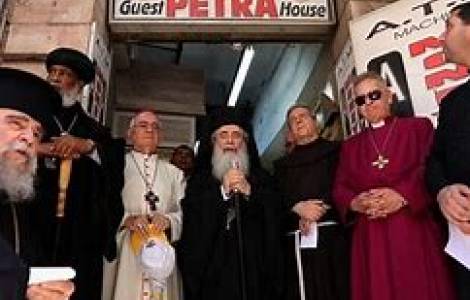Jerusalem – Jewish “radical groups” committed to acquiring ecclesiastical properties in the so-called Christian Quarter of the Old City of Jerusalem aim to sabotage the plural identity of the Holy City, obstruct the Christian pilgrim route and weaken the Christian presence in Jerusalem.
This is what the 13 Patriarchs and Heads of the Churches and ecclesial communities of Jerusalem write, in the umpteenth alarm launched regarding not always transparent real estate transactions that in their opinion aim to undermine the so-called “Status quo”, the set of rules and customs on which the coexistence between different religious communities in the ancient part of the Holy City is based. In their new joint statement, released on Tuesday 7 July, the Heads of the Churches and ecclesiastical communities of Jerusalem refer explicitly to a recent judgement by the District Court of Jerusalem, which on Wednesday 24 June definitively rejected the request with which the Greek Orthodox Patriarchate of Jerusalem asked to cancel the acquisition of three patriarchal real estate by the Jewish settler organization, Ateret Cohanim .
The joint statement signed by the Patriarchs and Heads of the Churches and Ecclesial Communities of Jerusalem – including Orthodox Patriarch Theophilos III, Archbishop Pierbattista Pizzaballa, Apostolic Administrator of the Latin Patriarchate of Jerusalem, and Father Francesco Patton ofm, Custos of the Holy Land – underlines that the fate of those buildings that once belonged to the Greek Orthodox Patriarchate cannot be liquidated “as a simple property dispute”, given the subjects involved. For the signatories, the real estate dispute brings out the design of forces that have long been committed to sabotaging “the historical Status Quo of the Holy Sites and rights of the Churches which are universally recognised”, to be protected from any attack. This is why the Heads of Churches express concern about the recent judgment of the Jerusalem District Court, and say they strongly support “the efforts of the Greek Orthodox Church in their plea for justice”. The signatories of the joint statement, citing the Prophet Amos, address directly the Israeli government, with the request to “act in order to safeguard the integrity of the Christian heritage and patrimony in the Old City, as well as the Holy Sites and the rights of the residents of the Christian Quarter of Jerusalem”.
The legal dispute over properties disputed between the Greek Orthodox Patriarchate and the Jewish group, Ateret Cohanim has lasted for 16 years. Two of the three disputed buildings, the “Petra” and the “Imperial” hotels, are located near the Jaffa Gate, considered the most direct entrance to access the Christian area of the Old City of Jerusalem. The sale, as previously reported by Agenzia Fides, took place in 2004, and the news of the sale had provoked protests and discontent within the Greek Orthodox Christian community, culminating with the deposition of Patriarch Irenaeus I by the Holy Synod with the accusation of undue alienation of Patriarchate properties.
In August 2017, the Jerusalem District Court had already rejected the legal initiatives with which the Greek Orthodox Patriarchate of Jerusalem had attempted to make Ateret Cohanim’s acquisitions of the three properties disputed “illegal” and “unauthorized”.
After that ruling, the Patriarchs and Heads of the Churches of Jerusalem had already signed a joint document (see Fides, 5/9/2017) in which they denounced “a systematic attempt to undermine the integrity of the Holy City” and “to weaken the Christian presence in the Holy City”. Already in that ruling there was firm opposition to “any action” by “any authority or group” that has the effect of violating and undermining “laws, agreements and regulations that have ordered our life for centuries”. The Orthodox Patriarchate of Jerusalem had appealed against the 2017 ruling to the Supreme Court of Israel, which on 10 June 2019 had confirmed the regularity of the transfer of ownership of the properties, legitimately purchased by foreign intermediaries who acted on behalf of Ateret Cohanim. Then, in December 2019, the legal dispute reopened, after a judge from the Jerusalem District Court questioned the previous Supreme Court ruling, effectively opening up the possibility of starting a new trial on the controversial issue. Now, the umpteenth judgement of the Jerusalem District Court issued on June 24, 2020 seems to mark the definitive end of the arm wrestling around the disputed buildings of the old city of Jerusalem. The Greek Orthodox Patriarchate of Jerusalem reacted to the latest developments in the affair, however reiterating its intention to file a further appeal, again bringing the matter to the attention of the Supreme Court of Israel.
Source: Agenzia Fides






